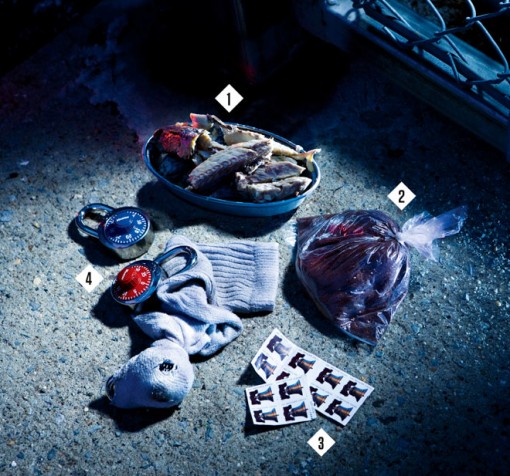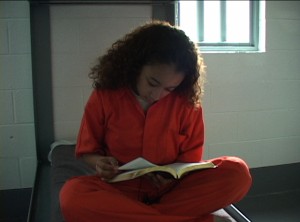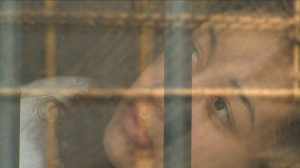My friend Gary shared some excerpts from prisoner zines that were published in the Utne Reader last year. I was particularly moved and somewhat overwhelmed by the words of Lisa “Lee” Savage who wrote a farewell letter to solitary confinement just before her eventual release from prison:
Dear Lowell CM Unit,
Over the past two years of being trapped within this “hellhole,” your behavior modification (human mortification) chamber, I have written many formal letters against you to your conceivers—the DOC administration, and I’ve penned several articles to inform prisoners and “free world” citizens of your insidious plans to destroy my mind and any chance for a productive life once I am freed from your chokehold. But today is the first time I’ve ever written to you personally and I have many things to say, so bear with me as I’ve had to bear with you every minute of these past two years while locked in your solitary confinement….
First, despite your lies, the stories you would tell me that I will never leave you, I could never leave you and within you is truly where I belong and you were just “trying to help me” become a proper woman, I AM leaving you. I’ve completed my penance and within a couple of days, I will walk out and not look back. I know you find this hard to believe and I can hear you saying, “You’ll be back. You’ll come home to me ‘cuz I’ve taught you to bring yourself back into my walls.” Don’t be so confident and sure of yourself or your ability to twist my mind. I think you already know I am different from the others you’ve courted and caged before me.
I admit the first time we met and you took me in 6 ½ years ago, I was quite naïve and rather weak in my physical, mental and emotional states. Yes, you definitely had control and I was at your mercy, which I never received any, regardless of how I begged and pleaded with you to stop beating me, to stop hurting me, to stop breaking my heart and PLEASE just let me hold onto ONE LITTLE HOPE. You never ceased in your cruelty and I responded the way you wished, like a feral animal lashing out at any and all human contact. I’ve never felt so ashamed, so helpless, but I found the answer to your abuse…it would end, everything would cease to exist, even me. I would escape you by hanging myself, my spirit would fly free, this I would gladly pay for with this shell of flesh and bone.
It would come to pass: I hang, I die, I’m free.
Fate has a way of placing its hands on the steering wheel of life though and I was revived and brought back to you. It was that anger that helped me live until EOS.
You know, I can’t believe I’m being so civil to you and not ranting.
Yes I can believe it. I’ve changed in this second time I’ve spent so unwillingly with you. I swore that this time, I wouldn’t allow you to destroy me, to steal my life no matter what you did to me. Somewhere along the way, I found that I wasn’t a victim. I would be a survivor, a fighter. I would see my son again. I would enjoy a summer day, a cool winter night or the spring rain. I would bask in the sunshine with my lover. I would defeat you, beat you at your own game, and teach others how to survive and fight you.
There were days, many days in which my strength and hope waned, days when I would fight the guards just to FEEL, to KNOW I am ALIVE, I am REAL. The pain was real, the suffering was real and through all the mental and emotional anguish I held onto that burning rage I had inside and I became a “soulja,” a trained reconnaissance soulja, an urban guerilla who was ready for your warfare on whatever level you chose to fight.
When there was no attack on me, but on my captive sisters, I fought for them. I had to guard and protect those who didn’t understand your tactics. After all, that is “how you roll”—to besiege and then sequester the innocent, the unsuspecting. Isolated, they are then abused and returned to the free world shell-shocked. These are my sisters. I couldn’t just turn a blind eye or a deaf ear, even if it meant that I put myself in the line of fire, targeted.
I admit you are quite the formidable adversary. That is why your reach has grown and now no one is safe from you, not even your conceivers and your capitalist grantors. I’m quite sure you’ve deceived them into believing that you will not bite the hand that feeds. Won’t they be surprised and horrified when even they become trapped within you…
But, as your reach continues to expand, so does my network—my allies, the grassroots guerillas who support my resistance.
Funny, you fail to realize that, even while locked within you, deep in your bowels, my army of one is multiplying. Many armies of one are joining to become an army of many, who will foster and implicate the prisoner resistance movement and who will bring this hidden revolution to light.
I am leaving you and I know you are angry at this, but you see, I am ANGRIER and I MUST take this fight where your scary ass doesn’t want me to—to the streets. For it is outside of your walls that this revolution is about to explode. I will take it to the everyday common hardworking folk, the masses of overworked and underpaid who are your targets, so they no longer remain blind. I will take it to the uncertain and educate them, give them weapons to fight you. I will take it to the elitists on their pedestals and knock them down.
This is a war all right, a war for human rights and I will not allow you to take any more children from their families so that you can train them to become statistics of recidivism. You will not destroy my people. You will not destroy my family. For as much as you hate those you harm, I love them 100 times more.
My visionaries are beside me, inside me, speaking their truths.
My revolutionary sisters and brothers are everywhere, learning their truths.
Abolition has begun and it will not stop now.
I will not stop until all are free.
And this, Lowell Correctional Institution, is such a Savage Reality.
Until there are no more death chambers, I will fight.
Your Ex-Hostage,
(Lisa) Lee Savage
Lee was released on August 1st, and continues the struggle from the outside. To contact her, write to her at:
PO. Box 5453
Gainesville, FL 32627-5453





